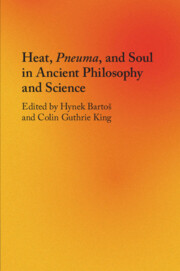Book contents
- Heat, Pneuma, and Soul in Ancient Philosophy and Science
- Heat, Pneuma, and Soul in Ancient Philosophy and Science
- Copyright page
- Contents
- Contributors
- Preface
- Introduction
- I Early Greek Philosophy and Medicine
- II Aristotle
- Chapter 7 Heat, Meteorology, and Spontaneous Generation
- Chapter 8 Aristotle on the Nature in the Pneuma and the First Body
- Chapter 9 Aristotle on the Powers of Thermic Equilibrium
- Chapter 10 Why Animals Must Keep Their Cool: Aristotle on the Need for Respiration (and Other Forms of Cooling)
- Chapter 11 Soul’s Tools
- Chapter 12 When Life Imitates Art: Vital Locomotion and Aristotle’s Craft Analogy
- Chapter 13 Blood, Pneuma, or Something More Solid? Aristotle on the Material Structure of Perceptual Apparatus
- Chapter 14 The Pathological Role of Pneuma in Aristotle
- Bibliography
- Index Locorum
- Index
Chapter 7 - Heat, Meteorology, and Spontaneous Generation
from II - Aristotle
Published online by Cambridge University Press: 20 February 2020
- Heat, Pneuma, and Soul in Ancient Philosophy and Science
- Heat, Pneuma, and Soul in Ancient Philosophy and Science
- Copyright page
- Contents
- Contributors
- Preface
- Introduction
- I Early Greek Philosophy and Medicine
- II Aristotle
- Chapter 7 Heat, Meteorology, and Spontaneous Generation
- Chapter 8 Aristotle on the Nature in the Pneuma and the First Body
- Chapter 9 Aristotle on the Powers of Thermic Equilibrium
- Chapter 10 Why Animals Must Keep Their Cool: Aristotle on the Need for Respiration (and Other Forms of Cooling)
- Chapter 11 Soul’s Tools
- Chapter 12 When Life Imitates Art: Vital Locomotion and Aristotle’s Craft Analogy
- Chapter 13 Blood, Pneuma, or Something More Solid? Aristotle on the Material Structure of Perceptual Apparatus
- Chapter 14 The Pathological Role of Pneuma in Aristotle
- Bibliography
- Index Locorum
- Index
Summary
Aristotle divides the physical world between a celestial realm, which is alive but neither hot nor cold, and a sublunary realm, which is moved by heat in two forms: the vital heat of the biological works and the inanimate fire, the operation of which is explained in the Meteorologica. In the context of the second division we find Aristotle distinguishing between the macrocosm (roughly the world according to Physics, de Caelo, Generation and Corruption and the Meteorologica) and the microcosm (the realm of the biological works, the individual sublunary animals). Wilson argues that this second division does not overturn the first one, but rather complements it, for it has some bearing on the question of solar and vital heat. He further argues that Aristotle mediates the macrocosm and the microcosm through the conceptual apparatus of the spontaneous generation in which heat plays a manifest role.
- Type
- Chapter
- Information
- Heat, Pneuma, and Soul in Ancient Philosophy and Science , pp. 159 - 181Publisher: Cambridge University PressPrint publication year: 2020
- 1
- Cited by

